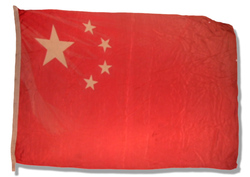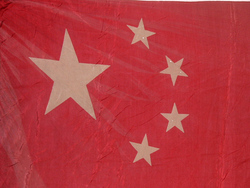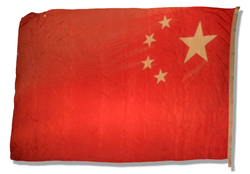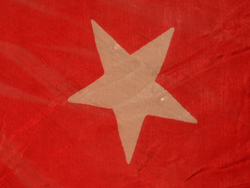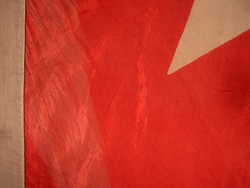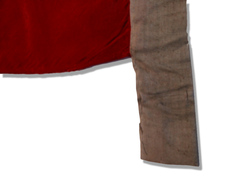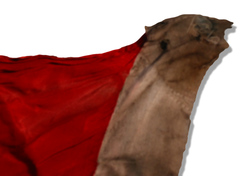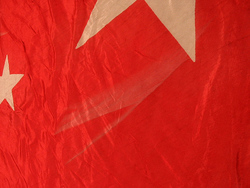China - PR, military battle flag - Sino-Soviet clash at Zhen Bao/Damansky Island, 1969
This national flag of the People's Republic of China was once flown on Zhen Bao Island district in the Northeast Frontier, by troops from the Peoples Liberation Army (PLA), whilst they were garrisoned in that area during in the Sino-Soviet border conflict of 1969. This was a series of armed border clashes between the Soviet Union and the People's Republic of China at the height of the Sino-Soviet split.
The most serious of these border clashes occurred in the vicinity of Zhenbao Island, "Treasure Island" or Damansky Island in Russian. Battles with some considerable loss of life were fought around this small island in the Ussuri River on the border between the USSR and People's Republic of China.
On the second of March in 1969, Soviet border guards stationed on Zhenbao Island were ambushed by Chinese troops; suffering a total of 31 casualties and 14 wounded. Two weeks later the Soviets responded by bombarding Chinese battalions that were camped near the Ussuri river and then later by invading Zhenbao Island. The Soviets claimed to have only suffered 60 or so casualties whilst inflicting devastation on Chinese forces. Likewise, Chinese troops claimed the inverse.
As the prospect of outright war between the two countries escalated, fears that open war could result in the use of nuclear weapons heightened. Moscow even suggested as much, through various channels, but historians have been unable to confirm that the Kremlin seriously entertained the prospect of a pre-emptive nuclear strike on the Chinese mainland. Instead, the Soviets massively increased their troop deployments along the Chinese border; eventually exceeding 500,000 troops including 25 divisions, 1,200 aircraft and 120 medium-range missiles. Further border clashes occurred in August 1969, this time along the western section of the Sino-Soviet border, in Xinjiang. The PLA matched this build-up with comparable numbers.
As war tensions mounted, the Chinese and Soviet governments took steps to mitigate the dangers of full-scale conflict. September in 1969 saw the Soviet Prime Minister Kosygin stop in Beijing to talk with the Chairman of the PRC - at that time Zhou Enlai. The talks were actually conducted in Beijing airport. However, despite the frosty reception, both premiers came to agree that they would reinstate formal diplomatic relations and begin a process to negotiate the disputed border territories. Subsequently, on May 19, 1991, the two sides came to agreement that the island belongs to the PRC.
Though the photo tends to show yellow stars on this flag, the stars are actually white. The fact that it was for military use may explain why it deviated from the national star color of yellow; or it may have been a hastily produced variant. This rare specimen was discovered in a military storehouse after the demobilization.
ZFC Significant Flag
Sources:
Kai Bin Yan letter (translation by Julia Liu), 17 March 1997, Zaricor Flag Collection Archives
Sino-Soviet border Conflict, Wikipedia, 16 November 2011, from:
http://en.wikipedia.org/wiki/Sino%E2%80%93Soviet_border_conflict
Zhenbao Island (Damansky Island), Wikipedia, 16 November 2011, from:
http://en.wikipedia.org/wiki/Zhenbao_Island
Image Credits:
Zaricor Flag Collection
